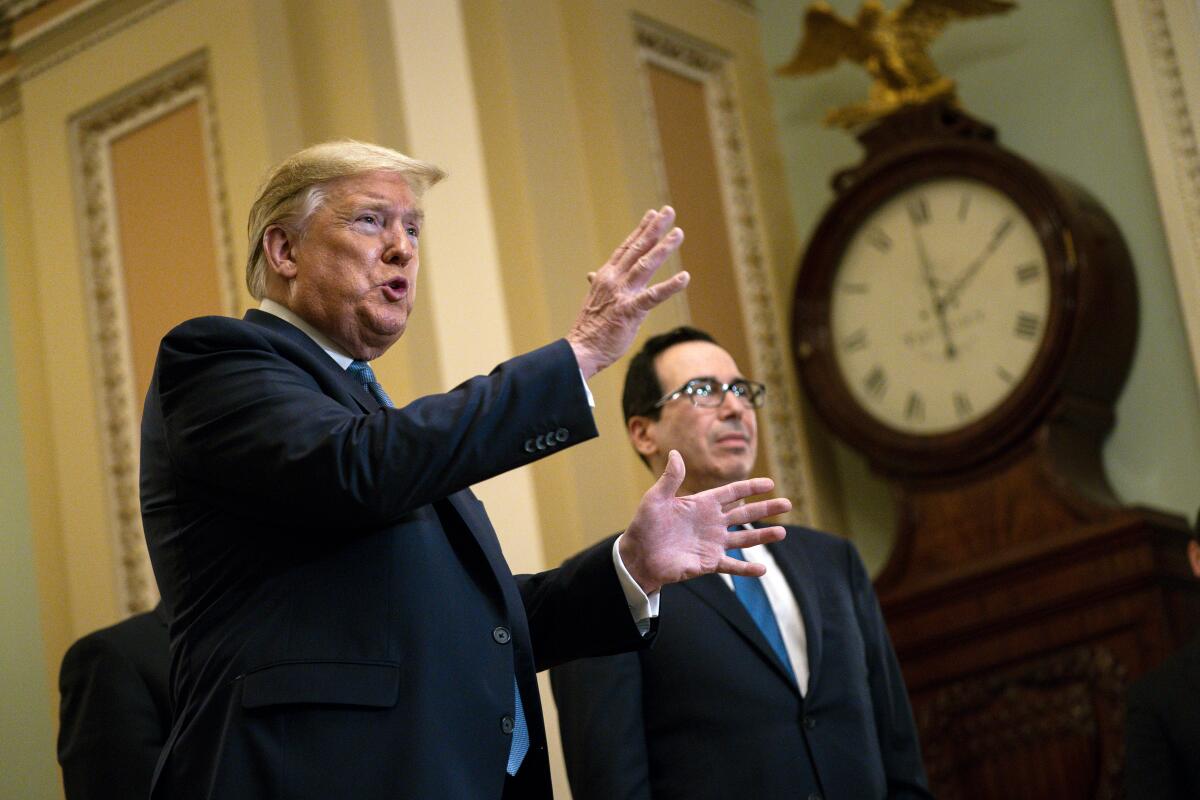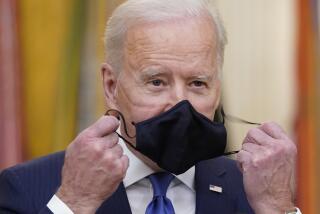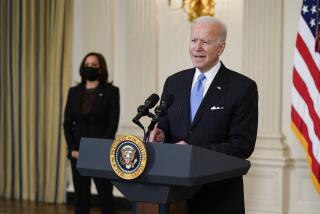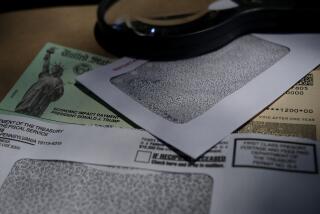Paid sick days? Payroll tax cut? Pros and cons of economic ideas to calm coronavirus fears

President Trump, in a nationwide address Wednesday night, proposed a broad menu of economic aid for individuals and companies battered by the coronavirus pandemic.
In the Democratically controlled House, Speaker Nancy Pelosi (D-San Francisco) hopes to vote on a separate economic stimulus proposal Thursday.
The proposals run the gamut, including quick tax cuts and tax holidays, government-financed paid sick leave, aid for small businesses, and targeted bailouts for industries especially hard-hit, such as the airlines and cruise ship operators.
Here’s a look at several key proposals, and their pros and cons:
Payroll tax holiday
The “most important, powerful piece” of Trump’s relief package, in the words of the president’s economic advisor, Larry Kudlow, is a payroll tax holiday.
Congressional leaders in both parties were cool to the proposal, but Trump late Wednesday repeated his call for it.
Besides the hefty cost — it would add several hundreds of billions of dollars to the federal debt — a suspension of the payroll, or social security, tax isn’t seen as particularly well-targeted or fast-moving enough to turn things around.
For an employee making $25,000 a year, it would amount to an extra $60 in take-home pay every two weeks.
Moreover, if you’re not in the labor force, like many elderly and long-term unemployed, you won’t get anything. And if you are not covered by federal withholding taxes, like those in the gig economy, you won’t see any immediate benefit. Nor does it help those who may be temporarily idled or see a cut in their work hours due to the economic disruptions caused by the virus.
Harry Holzer, a public policy professor at Georgetown University, described a payroll tax cut as “general stimulus for people who aren’t hurt.”
Extending the tax deadline
The plan to extend the April 15 tax filing deadline, said Treasury Secretary Steven T. Mnuchin, would apply to most everyone except for the “super rich.”
He called it a “big stimulus” that would pump more than $200 billion into the economy. That figure — compared with more than $300 billion of taxes paid last April — appears to be the amount that taxpayers would hold onto until sometime later.
It’s not clear how stimulative that would be, however, at least not to economists and small business owners like Seth Weiner.
Weiner is chief executive of Sonic Promos, a firm in Gaithersburg, Md., that specializes in selling promotional products such as hats, stress balls and memory sticks. His business customers use them for their marketing and internal company functions and events.
But since the coronavirus outbreak, he’s had trouble getting merchandise from China on time, and now many companies are canceling events, which means less need for branded goods.
Weiner said that his company would only see a small benefit from the tax deferral. “It just means I could hold what’s left of my tax dues for a little while,” he said. “And maybe we get paid a bit faster on some invoices.”
Experts say the real beneficiaries of a tax date delay would be higher-income households. As Oxford Economics notes, “While the tax deferment would provide important relief to individuals owing taxes during this virus outbreak, we note that 80% of those liabilities are owed by workers with income above $100,000, over 50% of workers with income above $250,000 and 25% of workers with income above $1,000,000.”
Federal money for Medicaid, food stamps
Most experts agree that helping states pay for needed testing and medical care is the first thing the federal government should do.
Jay Shambaugh, an economist at the Brookings Institution, said Washington could, for example, pick up an additional $50-60 billion in costs for Medicaid, the federal-state medical program for low-income individuals.
With the rapid increase in coronavirus cases, he said, some states are feeling budget strapped and looking to cut other programs like education, which would only do further damage to the economy.
Similarly, the federal government could loosen rules on work requirements for individuals to qualify for SNAP, also known as food stamps, which would help workers who suddenly find themselves quarantined or idled. A growing number of companies are telling employees to not come to work if they have symptoms.
“You don’t want people to have to make a choice: Do I go to work to meet the threshold [to qualify for SNAP] or do I stay home?” said Shambaugh.
Expansion of unemployment benefits
During the Great Recession in 2007-09 and the slow recovery that followed, the bipartisan stimulus package included support for states to extend the maximum length of jobless benefits.
Unlike the European system, the U.S. unemployment insurance program provides benefits for only those who are available for work and looking for a job, not for workers who have their hours cut — a distinct possibility as businesses respond to shrinking traffic.
In a letter to Congress this week, more than 50 labor and community groups urged lawmakers to include so-called work-sharing benefits, allowing full-time workers to move to part-time status while they get compensated through the program for reduced hours.
Economists say extending the duration and amount of unemployment benefits paid also would better protect workers, expanding a program that’s been a common form of stimulus during hard economic times.
Paid sick leave
One in four workers in private industry do not have access to paid sick leave, and that jumps much higher for part-time workers and employees in the service industry.
Other workers who have paid time off when they’re sick often get just a few days.
Workers in low-wage services are thus among the most vulnerable to the economic fallout from the health crisis. Trump said Wednesday that he would soon announce emergency action to provide financial help for workers who get sick or need to be quarantined, but he didn’t give details, and he also called for Congress to take action.
Some congressional Democrats want all wage earners to have 14 days of sick pay to meet the quarantine time frame. The Democratic bill would cover at least 14 days of sick pay, covering two-thirds of salary, to workers at companies that don’t provide the benefit.
Another idea to cover the extra cost to businesses is to offer tax credits to employers providing paid sick days to affected employees, including those taking care of an ill family member.
Expanding or loosening tax credits would certainly help, said Holly Wade, director of research & policy analysis at the National Federation of Independent Business, the leading small-business lobby.
She added that small employers also need relief on the administrative end of this issue. “Record-keeping and paperwork are increasingly burdensome for small businesses,” she said.
Company bailouts
Administration officials have talked about direct support for companies in such struggling industries as transportation services. There’s a lot of worry also about how U.S. energy firms will survive an oil price war between Saudi Arabia and Russia amid the virus pandemic.
During the Great Recession, the auto industry was hammered by falling demand, and car makers didn’t have access to a type of financing in which loans are available to bankrupt companies that allow them to operate through a restructuring.
That meant any vehicle manufacturer that went into bankruptcy would have been shuttered, said Mark Zandi, chief economist at Moody’s Analytics. “Given that the vehicle industry was critical to all of manufacturing, and failure of the industry would result in tens of millions more job losses, the federal government bailed it out,” he said.
Even though the government took ownership stakes in the auto firms and ultimately were able to recoup the cost of the bailout, it nonetheless caused a public uproar.
“Bailing out specific companies should only happen if failure of those companies can’t be handled using the bankruptcy system and their failure would do serious damage to the broader economy,” Zandi said. “Providing financial support to specific industries and companies should be the last thing on the list of fiscal stimulus measures.”
Small-business loans
Trump said he planned to ask Congress for $50 billion more for the Small Business Administration so it could offer low-interest loans to smaller firms to help them through financial hardship.
But surveys of small businesses show access to credit isn’t a problem for most of them right now, so it’s unclear how helpful such a measure would be.
More to Read
Get the L.A. Times Politics newsletter
Deeply reported insights into legislation, politics and policy from Sacramento, Washington and beyond. In your inbox three times per week.
You may occasionally receive promotional content from the Los Angeles Times.







